Dramatizing Dystopia
In a summer full of disturbing national events, playgoers have been attending a Broadway show that has caused some of them to faint, vomit, and pick fights with one another. The stage adaptation of George Orwell’s novel 1984, as I wrote in my review when it opened in New York City in June, is intense and disorienting in its horror movie-like depiction of a vicious and surreal totalitarian society. The Ministry of Truth is in charge of lies, the Ministry of Peace wages war, and, on stage for a loud, blinding, and bloody half hour, the Ministry of Love tortures Tom Sturridge, who portrays Winston. The scenes of torture are what have provoked the well-publicized audience disturbances.
What was more surprising to me about 1984 than the audience reaction is how common the dramatization of dystopian novels turns out to be:
- Ray Bradbury wrote his own stage adaptation of his 1953 novel Fahrenheit 451, about a firefighter whose job is to set fire to books, in a future world in which reading is illegal. The Godlight Theater Company in New York produced his 1979 script in a well-received production Off-Broadway at 59E59 Theater in 2006.
- Before The Handmaid’s Tale’s current incarnation as a TV series on Hulu, starring Elisabeth Moss as a woman enslaved to be a breeder in an America conquered by religious fundamentalists, Margaret Atwood’s 1985 novel was adapted into a film starring Natasha Richardson in 1990, a BBC radio drama and a separate opera in 2000, a ballet in 2013, and a one-woman play, which opened in Cincinnati, starring an actress named Corinne Mohlenhoff in 2015.
- Brave New World, Aldous Huxley’s 1932 novel, in which a worldwide government genetically engineers human beings in hatcheries and adults exist only to have sex and take soma (a mind-altering drug), has been theatrically adapted at least twice within the last couple of years. One was a straight play by Dawn King, and the other a musical that had its world premiere at the North Carolina Stage Company last year, and is reportedly aiming for a commercial run, possibly on Broadway.
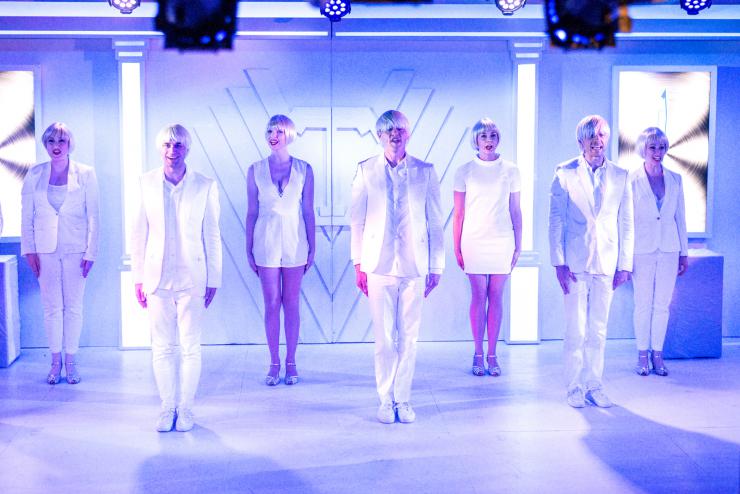
- Last year, Edward Einhorn and his dystopian-sounding Untitled Theater Company # 61 in New York City, adapted The Iron Heel, a 1908 novel by Jack London (far better known for his popular novels Call of the Wild and White Fang) which is a prophetic account of a dystopian world, which very much resembles Europe in the first half of the twentieth century.
- Sinclair Lewis’s play based on his own Depression-era novel It Can’t Happen Here, about the rise of a demagogue to power in the United States, was given several high-profile productions last year, including a staged reading by Peccadillo Theater Company at the National Arts Club in New York in April (which I wrote about in HowlRound) and a production in the two months leading up to the presidential election at the Berkeley Rep, which also organized a reading of the play throughout the country on a single day in October (which Paul Gagliardi wrote about in HowlRound).
- A Clockwork Orange is a 1962 novel by Anthony Burgess that focuses on Alex DeLarge, the teenage head of a violent gang of “droogs,” whom the authorities imprison and brainwash via aversion therapy. It has been adapted numerous times, most notably in Stanley Kubrick's 1971 film. But it’s been produced frequently on stage as well, including productions of an adaptation written by Burgess himself, in England—most famously by the Royal Shakespeare Company, using music by U2—as well as Canada, the United States, and New Zealand.
Why are there so many stage adaptations of [dystopian novels], which in many cases requires not just a translation of character and plot, but the presentation of an entire imagined society with its own manufactured history and arcane rules?
Now, a production of A Clockwork Orange, adapted from Burgess’s script by British director Alexandra Spencer-Jones and touring internationally for the past eight years, is currently in previews at Off-Broadway’s New World Stages.
Why are so many of these dystopian novels dramatized? There is no way that the full effect of almost any novel, with its length, density, and complexity, can be captured in two hours (or even four) on stage. So why are there so many stage adaptations of this genre of fiction, which in many cases requires not just a translation of character and plot, but the presentation of an entire imagined society with its own manufactured history and arcane rules? And why would an audience seek out such brutality in three dimensions?
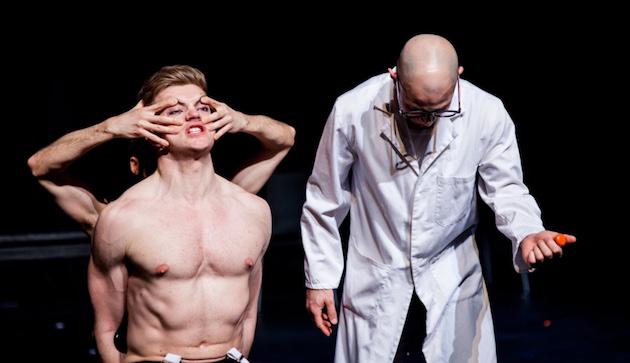
One answer to the first question is that, though these are imagined worlds, they are not unfamiliar. Most of these novels are perennial bestsellers and ubiquitous school assignments. “Some people have a connection with the book and that’s why they see the show,” says Clockwork Orange director Alexandra Spencer-Jones. Sales of many of these novels have seen a spike since the campaign and election of Donald Trump as President of the United States.
That leads to what many see as the main reason for this surge in stage adaptations of dystopian literature: “It’s not so far from the political era that we are in now,” says Jonno Davies, who is portraying Alex in A Clockwork Orange. To help prepare for his role, he says, he read political speeches.
“It’s a heightened reality,” adds Spencer-Jones. “It really doesn’t feel that ‘sci-fi’ to me when I see a group of people in the street who are looking at their cell phones, rather than looking up and speaking to one another; that doesn’t feel that far away from being brainwashed.”
The director makes a persuasive case that A Clockwork Orange is rooted more directly than many of the other dystopias in current society, going just a little further than what’s plausible. But what of 1984?
Let us grant that it is unmistakably Orwellian when Kellyanne Conway labeled Trump’s lie about the size of the crowd at his inauguration as “alternative facts,” and that the president has been lying ever since, his documented false and misleading claims breaking 1,000 in August. “Trump’s lies, and his urge to tell them, are pure Big Brother crude, however oafish their articulation,” Adam Gopnik wrote in the New Yorker a week after the inauguration, in an article presenting the parallels with Orwell’s novel.
As upsetting as these parallels are, it is objectively an exaggeration to claim we are “not so far” from these dystopian worlds. Not so far from Room 101 torture chambers administered by the US Department of Love? The literal and emotional violence in many of these novels is deliberately extreme.
That may hold a key to the frequency with which they are being dramatized. Those extreme elements are inherently theatrical. This observation requires a caveat: We are not talking about the over-the-top gore of the Kill Bill or Rambo variety, but closer to the extreme conflict and tension in Greek and Shakespearean tragedies. In almost all these dystopian stories, one character tries against all odds to fight the ugly world that surrounds them; in most, that person is defeated. In keeping with Aristotle’s analysis of tragedies in the Poetics, these stories when put on stage should incite the audience to feel pity and fear for these everyman heroes or heroines.
One can argue that we shouldn’t leave with a sense of well-being given what’s going on outside the theatre’s walls, but what disturbed me about '1984' was not any thoughts it provoked about the real world.
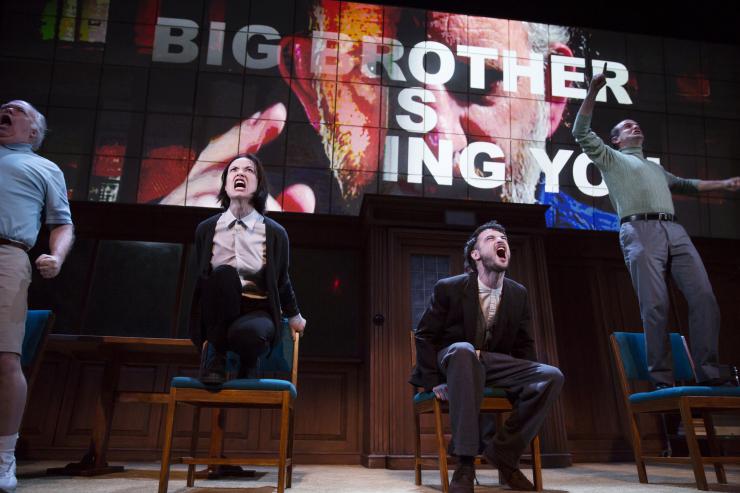
Will this lead to catharsis—a purging of these feelings by the end of the show, replaced by a sense of well-being? It did not for me in the current Broadway production of 1984. I am apparently not alone. Attendance at 1984 is among the lowest of all shows playing on Broadway.
One can argue that we shouldn’t leave with a sense of well-being given what’s going on outside the theatre’s walls, but what disturbed me about this production was not any thoughts it provoked about the real world, but its floridly aggressive stagecraft.
Eight years ago, the Godlight Theater Company produced an adaptation of 1984 that was not graphic, but still “chilling” and “creepy.” The Telescreens were not presented as assaultive high-tech video projections but were represented by four actresses chattering incessantly.
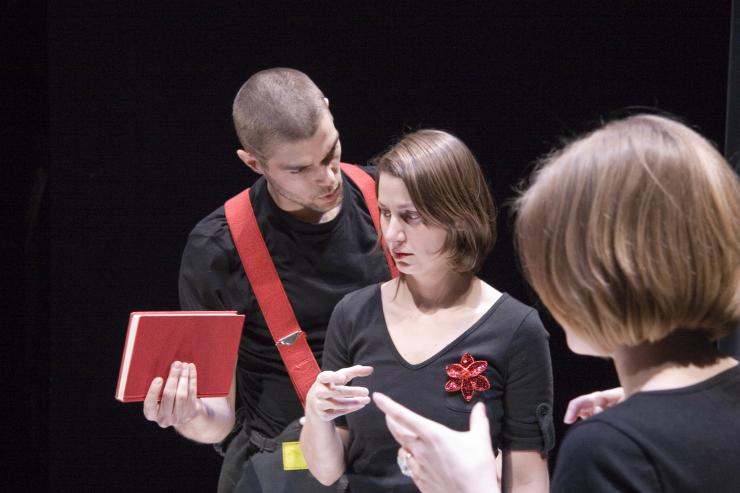
Godlight has been adapting novels to the stage since artistic director Joe Tantalo founded the company in 1994, and these include dystopian literature: not just 1984 and Fahrenheit 451 but also A Clockwork Orange and Blindness by Nobel Laureate José Saramago, with another adaptation of a dystopian novel in the works.
“These aren’t exactly knee-slapping family comedies we are talking about here,” Tantalo says, “but I think they are worth exploring.” The trick, he believes, is to find imaginative ways to translate the horror from the page to the stage:
Theatre is not film and it is not television, so you don’t need to be so goddamn literal about everything. You have got to give the audience more credit that they are thinking beings, and allow a theatre piece to spark conversation without manipulating people into what the conversation should be. It’s not about inundating the audience with violence and horrific imagery; that’s something you see every day in the news.
Theatre can offer something different. It can give us the immediacy of other breathing human beings, not just the actors, but fellow members of the audience, allowing us to feel less isolated, giving us a space to try to figure out together where we may be headed and what to do about it.
Jonathan Mandell’s NewCrit piece usually appears the first Thursday of each month. See his previous pieces here.

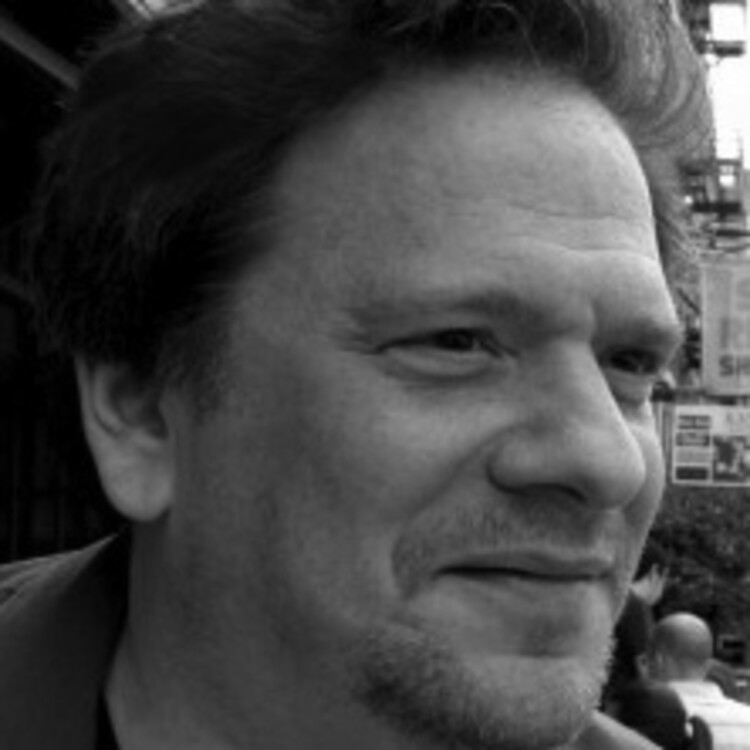
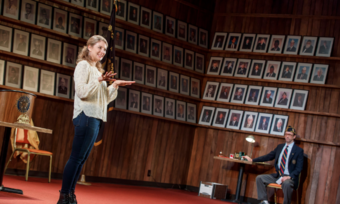

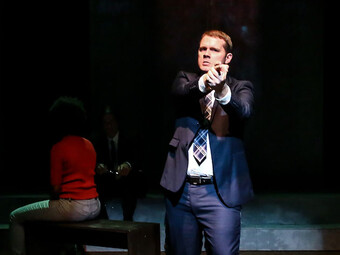

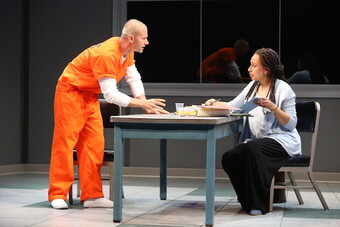
Comments
The article is just the start of the conversation—we want to know what you think about this subject, too! HowlRound is a space for knowledge-sharing, and we welcome spirited, thoughtful, and on-topic dialogue. Find our full comments policy here
The 2011 nationwide reading of “It Can’t Happen Here” was the idea of Darryl Henriques, who proposed it as a way to honor the 75th anniversary of the Federal Theatre Project and its October 1936 productions of the play in 21 US cities. Henriques was an early member of the San Francisco
Mime Troupe—he did the research, found the early poster and production images, and made the scripts available. I took on the organization of the 2011 event; it was sponsored by Dell'Arte International and the SF Mime Troupe. 22 theatres and universities took part in that 2011 reading.
The event was written about in The Nation by Richard Lingeman (http://www.thenation.com) November 2, 2011
In July Darryl called me to propose another nationwide reading Nov. 6, 2017--one year from the eve of last year’s presidential election. Bradd Howard is our 2017 organizer; for help in organizing a 2017 reading, or to get more information or scripts, email Bradd at [email protected]
Visit our FB page: Nation-Wide-Reading-of-It-Cant-Happen-Here-by-Sinclair-Lewis-152921454785776/
to get the 2017 updates, view poster/photo images and find links to articles on the Federal Theatre Project, read reports of the 2011 readings, etc.
Decent article, but it seems to me to bury the most important point in favor of more polically correct points:
"...why would an audience seek out such brutality in three dimensions? One answer is that, though these are imagined worlds, they are not unfamiliar."
Audiences don't seek out such brutality; producers (or artistic directors) put on such plays for the same reason that they (unfortunately) put on so much Shakespeare: Fame. That is, people tend to go to plays (or movies or watch TV) by famous playwrights or adapted from famous novels more than those they've never heard of.
And since the mainstream media for the last year or so has been constantly talking about these particular famous dystopian novels (because of Trump), it makes sense that these works (being extra famous right now) would be tempting for producers to put on.
"Theatre is not film and it is not television, so you don’t need to be so goddamn literal about everything."
Uh oh! I hope Tantalo is prepared to be reamed by all the playwrights out there (and their supporters) who demand the right to have naked women on stage being (as far as the audience can tell) (and sometimes in reality) savagely beaten! Doesn't he know that (as far as these self-proclaimed "anti-fascists" are concerned) using, for example, a puppet horse in Equus is no longer enough, that nowadays it is required that a real horse be used, and that the sex appear (to the audience) (and perhaps in reality) to be real?!
I'm glad you enjoyed the article.
What are the "politically correct points" that I make? And what does "politically correct" mean to you?
As you yourself have experienced, the progressive left are shockingly guilty of Orwellian thought policing and censorship as well. From calls for hate speech laws to organised blacklisting to Wikipedia edit-a-thons to open contempt for free speech to completely justifying political violence to the redefinition of terms such as racism to attacking scientific consensus to the spread of collective guilt and quite literal public Minutes of Hate...I've never seen anything like it from the left. I've seen free speech and individualism and pacifism all equated with Nazism.
I have been censored and removed from every major platform for offering the mildest of criticisms and for asking the simplest of questions.
At this point, I am more worried about leftist collectivism in the arts. There is no conservative presence. We are the cultural establishment and as a liberal I am appalled at our assaults on language, thought and privacy.
Intesectionality has unleashed the monster of collective guilt and it burns through the left, compromising academia, the arts, social media and everyday human communication.
The only connection I see between my article and your comment is that we both use the word "Orwellian."
People of nearly every conceivable political perspective left to right have used that word, and Orwell's work, to make their points.
Your points are highly debatable, and I hope some commenters debate them, but I'll only say: I can't remember having 'experienced censorship by the progressive left.' Can you explain what you're talking about?
I have asked questions regarding the questionable nature activists use statistical analysis--by assuming that correlation PROVES causation--and had my Twitter account suspended. I was ejected from a festival I've been part of for years as they decided to exclude white men. I had earned that slot. When I pointed out that it is wrong to judge people this way, I was told I was entitled. I was told I had historical privilege and power, regardless of my actions.
The past is a foreign country. We're all expected to live there.
I have seen critics blacklisted for petty offenses. I have heard administrators openly talk about not hiring any, you guessed it, straight white men. I have had former friends describe my work as 'white nonsense'. I have had talkbacks cut short by activist moderators. I've been advised by visibly frightened ADs to keep my mouth shut. I've seen friends hounded online for implied bigotry until their accounts go silent. I have been angrily told not to write female or minority characters, and I have been angrily told to write them.
I've watched comment sections be removed or shut down. I've seen work ignored on the basis of sexual identity, against gay people with the wrong opinions. I've seen a reporter for Windy City be demoted for covering anti-Semitism at the Chicago Dyke March. There were complaints, you see? By pro-Palestinians.
Shall I continue?
This isn't coming from the right. We know what they're doing.
What are we doing?
Let me clarify my question. You write: "As you yourself have experienced, the progressive left are shockingly guilty of Orwellian thought policing and censorship as well." I assumed the "you yourself" meant me personally. So I was asking in what ways I myself personally have been censored and policed.
And, since (again) I don't see how your comments have anything to do with my article, maybe I should ask: How do YOU see them as related? Are you saying the rise in stage adaptations of dystopian literature is somehow connected to the rise of the incidents you describe?
I have read your comments arguing over whether New York critics should be blacklisted based on race. Perhaps you don't perceive that as being policed. I see it as unacceptable. Bullying at least, coupled with accusations of racism. But you are right, I don't speak for you.
I see the rise of dystopian fantasies as certainly connected to Trump, authoritarianism, etc. And I see those very threats being used to justify absolutely amoral behavior on the left, ideas that hurt everyone. So tangentially related at best.
What can I say? I don't see anyone willing to address this. I reached. Tell me, where can I discuss these things?
Just dismiss it. My apologies. I'll try to ignore the whispers as well.
That's a provocative thought that there may be a connection between the surge in popularity of dystopian literature and the attitudes of both the left and the right. It's worth pondering more. Are more and more people viewing stories like 1984 as an increasingly plausible reality, the fear and threat of such an outcome causing more of us to embrace us-versus-them extremism and eschew nuance?
(I'm sorry that I don't recall any comments that I made that can be summed up as arguing against "NY critics being blacklisted based on race." I HAVE defended drama critics repeatedly in the comments sections of HowlRound when they've been accused of having political or cultural bias.)
I understand. Thank you listening.
I'm personally finding it difficult to read Orwell anymore. Uncanny. But the situation on the ground does remind me of the Weimar period before the rise of National Socialists, where they and the far left communists fought in the streets, and the Nazis rise was hastened by far left violence.
All for now. My apologies for the confusion.